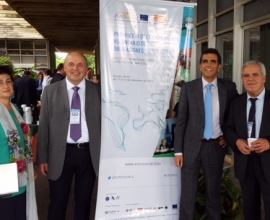EUROsociAL supports the Receita Federal do Brasil (RFB) in implantation of the new property register model
The new model will require a national property register law
Within the framework of the inclusive and sustainable tax systems line of action, the EUROsociAL Programme, financed by the European Union, held the International Workshop on Property Registers, in Brasilia from 17th to 19th November 2015.s
Brazil's tax administration, the Receita Federal do Brasil (RFB), has launched an ambitious strategic project aimed at creating a new database capable of correctly identifying and locating each taxpayer, and providing information on the person's activities and tax obligations. This project establishes the need to create a general property register (register of real-estate) which integrates data from the rural property register (CNIR) with data on urban properties, currently under the exclusive authority of municipalities.
The new model must include mechanisms to guarantee its maintenance and sustainability, as well as define the model for assessing rural property values so that the data currently in the rural property register (CNIR) can be used for tax purposes.
Moreover, the project will require a national law on property registry that is binding upon the numerous organisations involved and defines the principles necessary to avoid data duplication in order to optimise the efforts of the different territorial administrations taking part.
Accordingly, the International Workshop on Property Registers was held in Brasilia at the ESAF (School of Tax Administration), with the participation of experts from Spain, France, and Germany, and nearly 70 attendees from different Brazilian institutions and bodies: RFB; Ministry of Finance; SERPRO (Federal Data Processing Service); MDA (Ministry of Agrarian Development); INCRA (National Institute for Colonisation and Agrarian Reform), Embrapa (Brazilian Agricultural Research Corporation); SPI (Secretariat of Planning and Strategic Investments) of the Ministry of Planning, Budget, and Management; IBGE (Brazilian Institute of Geography and Statistics); Brazilian Environment and Renewable Natural Resources Institute; CNJ (National Council of Justice); IRIB (Brazilian Property Registry Institute); Association of Notaries and Registrars; IPEA (Institute for Applied Economics Research); Bank of Brazil; Prefecture of Campinas; Prefecture of Belo Horizonte; CNM (National Confederation of Municipalities); UNICAMP (State University of Campinas); Comptroller General of the Union; CNB (Notarial Association of Brazil); and CONCAR (National Cartography Commission).
The objectives of the workshop were, on the one hand, gain deeper knowledge of the property registry systems of Spain, France, and Germany, and their best practices; and, on the other, to work jointly with the Brazilian participants and European experts on new property assessment models and mechanisms for obtaining valuation data for rural properties; procedures for exchanging data for integration in a database of real-estate assets at the national level; and a work plan for preparing a property registry law in Brazil.
The workshop was developed with the technical advising of experts from three European institutions: Spain's Directorate-General of Property Registry; Germany's Lower Saxony Property Registry Office; and France's Languedoc-Roussillon Regional Directorate of Public Finance of the Ministry of Finance.
This activity is part of the Voluntary Compliance With Tax Obligations action of the Public Finance area of the EUROsociAL Programme, coordinated by FIIAPP, in which Spain's State Tax Administration Agency (AEAT) and the Inter-American Centre for Tax Administrations (CIAT) are acting as operational partners.
FIIAPP/AEAT/CIAT

